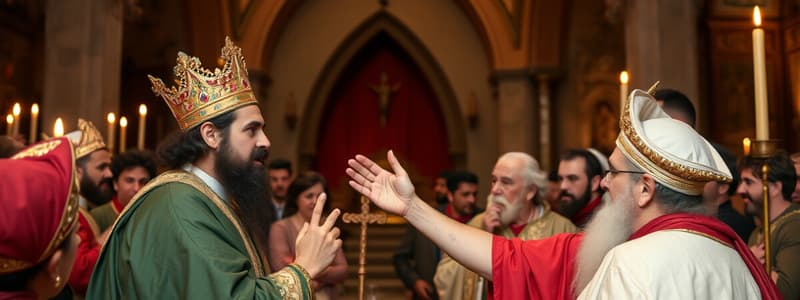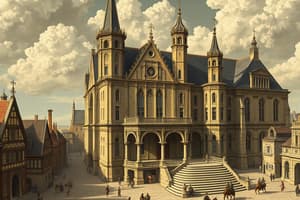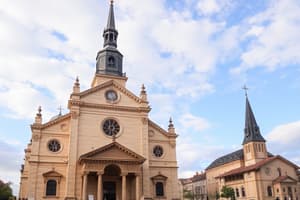Podcast
Questions and Answers
Which pope unsuccessfully opposed the French king for taxing the clergy?
Which pope unsuccessfully opposed the French king for taxing the clergy?
Boniface VIII
What is Simony?
What is Simony?
Selling of church offices
How did Henry II and Pope Innocent III clash over?
How did Henry II and Pope Innocent III clash over?
Who would be the archbishop of Canterbury
What established the principle that the king's power is limited?
What established the principle that the king's power is limited?
How was parliament able to serve as a check on the kings' power?
How was parliament able to serve as a check on the kings' power?
What was the name for the land around Paris that was ruled by kings?
What was the name for the land around Paris that was ruled by kings?
What English king did Philip II take land from when he tripled the size of his domain?
What English king did Philip II take land from when he tripled the size of his domain?
What were the primary goals of Louis IX's reign over France?
What were the primary goals of Louis IX's reign over France?
Which pope called the first Crusade in 1095?
Which pope called the first Crusade in 1095?
Which of the Crusades was the most successful?
Which of the Crusades was the most successful?
Name 3 kings that participated in the King's Crusade.
Name 3 kings that participated in the King's Crusade.
What city was captured at the end of the Fourth Crusade?
What city was captured at the end of the Fourth Crusade?
What is heresy?
What is heresy?
Who laid the foundation for a unified England?
Who laid the foundation for a unified England?
What did Henry II's uniform laws for all of England come to be known as?
What did Henry II's uniform laws for all of England come to be known as?
What English legislative body was established by Edward I?
What English legislative body was established by Edward I?
Who established the Estates-General?
Who established the Estates-General?
Who subdued the Welsh and made his son prince of Wales?
Who subdued the Welsh and made his son prince of Wales?
Who made England part of the Danish Empire?
Who made England part of the Danish Empire?
Who was called Barbarossa and married his son to the heiress of Sicily?
Who was called Barbarossa and married his son to the heiress of Sicily?
What king was forced to sign the Magna Carta?
What king was forced to sign the Magna Carta?
Who was defeated in battle by Richard but was successful in holding Jerusalem?
Who was defeated in battle by Richard but was successful in holding Jerusalem?
Who was crowned Holy Roman Emperor in 962?
Who was crowned Holy Roman Emperor in 962?
Define lay investiture.
Define lay investiture.
Define mendicant orders.
Define mendicant orders.
Define excommunication.
Define excommunication.
Define inquisition.
Define inquisition.
What agreement ended the controversy over who appointed clergymen?
What agreement ended the controversy over who appointed clergymen?
What does the word Friar mean?
What does the word Friar mean?
Why did Bernard of Clairvaux adopt a life of seclusion and strict discipline?
Why did Bernard of Clairvaux adopt a life of seclusion and strict discipline?
Why was the College of Cardinals created?
Why was the College of Cardinals created?
Which order of monks became closely associated with the Inquisition?
Which order of monks became closely associated with the Inquisition?
Who is credited with establishing the Holy Roman Empire?
Who is credited with establishing the Holy Roman Empire?
Who was given the title 'founder of the English navy'?
Who was given the title 'founder of the English navy'?
At the beginning of the Capetian rule of France, who opposed more land and authority than the king?
At the beginning of the Capetian rule of France, who opposed more land and authority than the king?
What was the Fourth Crusade centered on?
What was the Fourth Crusade centered on?
What promoted an increase of trade and the use of a money economy?
What promoted an increase of trade and the use of a money economy?
What motivated the Crusaders to go to the Holy Land?
What motivated the Crusaders to go to the Holy Land?
Study Notes
Papacy and Church Practices
- Boniface VIII unsuccessfully opposed the French king over taxing the clergy.
- Simony refers to the selling of church offices.
- Heresy is the holding of beliefs contrary to the teachings of the church.
- Lay investiture is the appointment of clergymen to positions of authority.
Kings and Governance
- The Magna Carta established the principle that the king's power is limited.
- Parliament served as a check on the king's power by asserting its power of the purse.
- Common law refers to the uniform laws for all of England established by Henry II.
- Edward I established the English legislative body known as parliament.
- Philip IV established the Estates-General in France.
- Canute made England part of the Danish Empire.
Crusades and Religious Conflicts
- Pope Urban II called for the First Crusade in 1095, which was the most successful Crusade.
- Key figures in the King's Crusade included Frederick Barbarossa (Germany), Philip Augustus (France), and Richard the Lion-Hearted (England).
- Constantinople was captured at the end of the Fourth Crusade.
- Saladin was defeated in battle by Richard but successfully held Jerusalem.
- The Fourth Crusade centered around economic issues, promoting trade and a money economy.
- Crusaders were motivated by a desire to serve Christ, defend the church, seek adventure, gain fame or fortune, and explore commercial opportunities.
Historical Figures
- Alfred the Great is credited with laying the foundation for a unified England and is considered the "founder of the English navy."
- Otto I was crowned Holy Roman emperor in 962 and is recognized for establishing the Holy Roman Empire.
- Frederick I, known as Barbarossa, married his son to the heiress of Sicily.
Church Reform and Orders
- Bernard of Clairvaux adopted a life of seclusion for church reform.
- The College of Cardinals was created to ensure that churchmen, rather than nobles or kings, would choose the popes.
- Dominicans became closely associated with the Inquisition, which was a church court aimed at maintaining doctrinal purity.
Key Agreements
- The Concordat of Worms ended the controversy over who appointed clergymen, resolving conflicts between church and state.
Land and Power Dynamics
- Ile-de-France is the land around Paris ruled by kings.
- King John lost land to Philip II of France, who tripled his domain.
- Edward I subdued the Welsh and made his son the prince of Wales.
Additional Definitions
- Mendicant orders are religious communities that rely on charity.
- Excommunication is the act of depriving an individual of the sacraments and church fellowship.
Studying That Suits You
Use AI to generate personalized quizzes and flashcards to suit your learning preferences.
Description
Review essential concepts from Chapter 9 with these flashcards. This study guide covers critical topics such as key historical figures and events that shaped the relationship between the church and the monarchy. Perfect for students preparing for exams or seeking to deepen their understanding of history.




